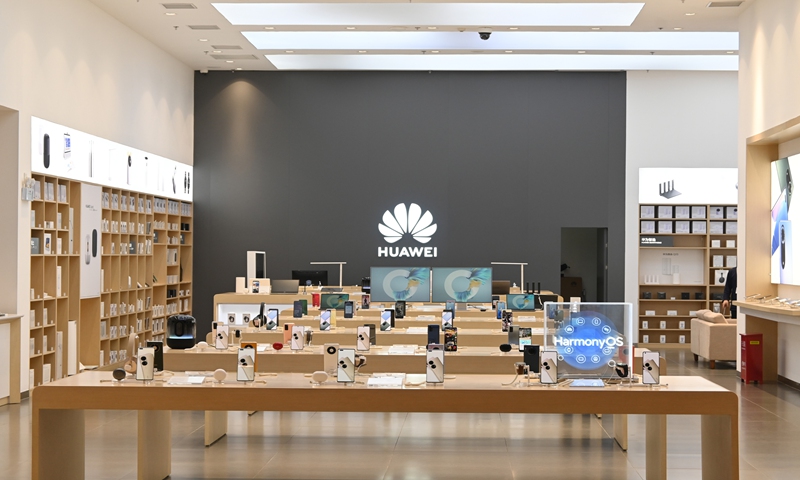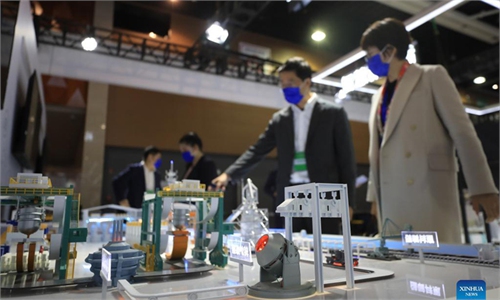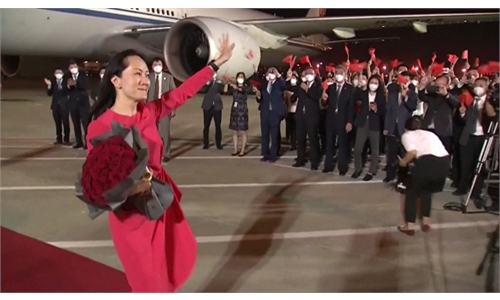
A flagship store of Huawei Photo: VCG
Chinese telecommunications firm Huawei on Friday reported revenue of 455.8 billion yuan ($71.19 billion) in the first three quarters of 2021, a "vertiginous drop" as its consumer business still suffered severely amid the US chip ban.
Revenues fell 32 percent, a significant slide from the same period last year, when the firm earned 671.3 billion yuan, up 9.9 percent year-on-year.
It announced a net profit margin of 10.2 percent.
"Overall performance was in line with forecasts," said Guo Ping, Huawei's Rotating Chairman. "While our B2C business has been significantly impacted, our B2B businesses remain stable. Through our ongoing commitment to innovation, research and development and talent acquisition, and rigorous attention to operating efficiency, we are confident we will continue to create practical value for our customers and the communities in which we work."
"Revenues have slumped by about 200 billion yuan over the last year. It's a cliff descent," Jiang Junmu, a veteran industry analyst who's been closely following the firm, told the Global Times on Friday.
The negative impact of four rounds of US sanctions over the past years, which has led to shrinking smartphone shares — its main source of revenue — has started to appear in its revenue this year, Jiang said, predicting the slide trend will continue.
In the semi-annual report released in August this year, Huawei's revenue in the first half of the year fell 29.7 percent year-on-year.
Huawei's smartphone market share was down 77 percent year-on-year and 18 percent month-on-month in the third quarter, an analysis report on the Chinese smartphone market released by Counterpoint, a market research organization, on Thursday showed.
Jiang noted though the firm has been diversifying its businesses into a wider area such as mining to crest new income sources, all these new businesses are still in the "investment phase rather than profit-making."
While the impact of the ban is still expanding, Huawei's profits have been steadily improving, which shows that the firm is concentrating on its core business despite the ban, analysts said.
"The increase in profits was mainly due to Huawei's digitalization push which has promoted efficiency, and also its spin-off of some low-profits lines such as its x86 server businesses," Huang Haifeng, a veteran industry insider, told the Global Times on Friday.
The report also came as media reported that the US Senate voted on Thursday to approve legislation to prevent Chinese technology companies including Huawei from receiving new equipment licenses from US regulators over the so-called national security threat, indicating a US sanction could continue.
Last month, Huawei's chief financial officer Meng Wanzhou returned home after nearly a three-year detention in Canada, which the Chinese government called arbitrary detention.
The comeback of Meng could be an inspiration for the firm's staff to continue the company's march forward amid headwinds, but it may not help with the key problem the firm is facing, an industry insider who's been closely following the firm, told the Global Times on Friday.
"Ramping up efforts to boost self-reliance and make breakthroughs in the chip sector could be the only way out for both Huawei and China's tech sector to defeat the US crackdown," the insider said.
Global Times

A flagship store of Huawei Photo: VCG
Chinese telecommunications firm Huawei on Friday reported revenue of 455.8 billion yuan ($71.19 billion) in the first three quarters of 2021, a "vertiginous drop" as its consumer business still suffered severely amid the US chip ban.
Revenues fell 32 percent, a significant slide from the same period last year, when the firm earned 671.3 billion yuan, up 9.9 percent year-on-year.
It announced a net profit margin of 10.2 percent.
"Overall performance was in line with forecasts," said Guo Ping, Huawei's Rotating Chairman. "While our B2C business has been significantly impacted, our B2B businesses remain stable. Through our ongoing commitment to innovation, research and development and talent acquisition, and rigorous attention to operating efficiency, we are confident we will continue to create practical value for our customers and the communities in which we work."
"Revenues have slumped by about 200 billion yuan over the last year. It's a cliff descent," Jiang Junmu, a veteran industry analyst who's been closely following the firm, told the Global Times on Friday.
The negative impact of four rounds of US sanctions over the past years, which has led to shrinking smartphone shares — its main source of revenue — has started to appear in its revenue this year, Jiang said, predicting the slide trend will continue.
In the semi-annual report released in August this year, Huawei's revenue in the first half of the year fell 29.7 percent year-on-year.
Huawei's smartphone market share was down 77 percent year-on-year and 18 percent month-on-month in the third quarter, an analysis report on the Chinese smartphone market released by Counterpoint, a market research organization, on Thursday showed.
Jiang noted though the firm has been diversifying its businesses into a wider area such as mining to crest new income sources, all these new businesses are still in the "investment phase rather than profit-making."
While the impact of the ban is still expanding, Huawei's profits have been steadily improving, which shows that the firm is concentrating on its core business despite the ban, analysts said.
"The increase in profits was mainly due to Huawei's digitalization push which has promoted efficiency, and also its spin-off of some low-profits lines such as its x86 server businesses," Huang Haifeng, a veteran industry insider, told the Global Times on Friday.
The report also came as media reported that the US Senate voted on Thursday to approve legislation to prevent Chinese technology companies including Huawei from receiving new equipment licenses from US regulators over the so-called national security threat, indicating a US sanction could continue.
Last month, Huawei's chief financial officer Meng Wanzhou returned home after nearly a three-year detention in Canada, which the Chinese government called arbitrary detention.
The comeback of Meng could be an inspiration for the firm's staff to continue the company's march forward amid headwinds, but it may not help with the key problem the firm is facing, an industry insider who's been closely following the firm, told the Global Times on Friday.
"Ramping up efforts to boost self-reliance and make breakthroughs in the chip sector could be the only way out for both Huawei and China's tech sector to defeat the US crackdown," the insider said.
Global Times



